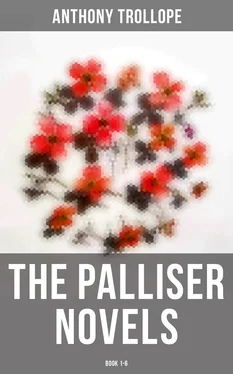Phineas found that the house was full at Saulsby, although the sojourn of the visitors would necessarily be so short. There were three or four there on their way on to Loughlinter, like himself,—Mr. Bonteen and Mr. Ratler, with Mr. Palliser, the Chancellor of the Exchequer, and his wife,—and there was Violet Effingham, who, however, was not going to Loughlinter. "No, indeed," she said to our hero, who on the first evening had the pleasure of taking her in to dinner, "unfortunately I haven't a seat in Parliament, and therefore I am not asked."
"Lady Laura is going."
"Yes;—but Lady Laura has a Cabinet Minister in her keeping. I've only one comfort;—you'll be awfully dull."
"I daresay it would be very much nicer to stay here," said Phineas.
"If you want to know my real mind," said Violet, "I would give one of my little fingers to go. There will be four Cabinet Ministers in the house, and four un-Cabinet Ministers, and half a dozen other members of Parliament, and there will be Lady Glencora Palliser, who is the best fun in the world; and, in point of fact, it's the thing of the year. But I am not asked. You see I belong to the Baldock faction, and we don't sit on your side of the House. Mr. Kennedy thinks that I should tell secrets."
Why on earth had Mr. Kennedy invited him, Phineas Finn, to meet four Cabinet Ministers and Lady Glencora Palliser? He could only have done so at the instance of Lady Laura Standish. It was delightful for Phineas to think that Lady Laura cared for him so deeply; but it was not equally delightful when he remembered how very close must be the alliance between Mr. Kennedy and Lady Laura, when she was thus powerful with him.
At Saulsby Phineas did not see much of his hostess. When they were making their plans for the one entire day of this visit, she said a soft word of apology to him. "I am so busy with all these people, that I hardly know what I am doing. But we shall be able to find a quiet minute or two at Loughlinter,—unless, indeed, you intend to be on the mountains all day. I suppose you have brought a gun like everybody else?"
"Yes;—I have brought a gun. I do shoot; but I am not an inveterate sportsman."
On that one day there was a great riding party made up, and Phineas found himself mounted, after luncheon, with some dozen other equestrians. Among them were Miss Effingham and Lady Glencora, Mr. Ratler and the Earl of Brentford himself. Lady Glencora, whose husband was, as has been said, Chancellor of the Exchequer, and who was still a young woman, and a very pretty woman, had taken lately very strongly to politics, which she discussed among men and women of both parties with something more than ordinary audacity. "What a nice, happy, lazy time you've had of it since you've been in," said she to the Earl.
"I hope we have been more happy than lazy," said the Earl.
"But you've done nothing. Mr. Palliser has twenty schemes of reform, all mature; but among you you've not let him bring in one of them. The Duke and Mr. Mildmay and you will break his heart among you."
"Poor Mr. Palliser!"
"The truth is, if you don't take care he and Mr. Monk and Mr. Gresham will arise and shake themselves, and turn you all out."
"We must look to ourselves, Lady Glencora."
"Indeed, yes;—or you will be known to all posterity as the fainéant government."
"Let me tell you, Lady Glencora, that a fainéant government is not the worst government that England can have. It has been the great fault of our politicians that they have all wanted to do something."
"Mr. Mildmay is at any rate innocent of that charge," said Lady Glencora.
They were now riding through a vast wood, and Phineas found himself delightfully established by the side of Violet Effingham. "Mr. Ratler has been explaining to me that he must have nineteen next session. Now, if I were you, Mr. Finn, I would decline to be counted up in that way as one of Mr. Ratler's sheep."
"But what am I to do?"
"Do something on your own hook. You men in Parliament are so much like sheep! If one jumps at a gap, all go after him,—and then you are penned into lobbies, and then you are fed, and then you are fleeced. I wish I were in Parliament. I'd get up in the middle and make such a speech. You all seem to me to be so much afraid of one another that you don't quite dare to speak out. Do you see that cottage there?"
"What a pretty cottage it is!"
"Yes;—is it not? Twelve years ago I took off my shoes and stockings and had them dried in that cottage, and when I got back to the house I was put to bed for having been out all day in the wood."
"Were you wandering about alone?"
"No, I wasn't alone. Oswald Standish was with me. We were children then. Do you know him?"
"Lord Chiltern;—yes, I know him. He and I have been rather friends this year."
"He is very good;—is he not?"
"Good,—in what way?"
"Honest and generous!"
"I know no man whom I believe to be more so."
"And he is clever?" asked Miss Effingham.
"Very clever. That is, he talks very well if you will let him talk after his own fashion. You would always fancy that he was going to eat you;—but that is his way."
"And you like him?"
"Very much."
"I am so glad to hear you say so."
"Is he a favourite of yours, Miss Effingham?"
"Not now,—not particularly. I hardly ever see him. But his sister is the best friend I have, and I used to like him so much when he was a boy! I have not seen that cottage since that day, and I remember it as though it were yesterday. Lord Chiltern is quite changed, is he not?"
"Changed,—in what way?"
"They used to say that he was—unsteady you know."
"I think he is changed. But Chiltern is at heart a Bohemian. It is impossible not to see that at once. He hates the decencies of life."
"I suppose he does," said Violet. "He ought to marry. If he were married, that would all be cured;—don't you think so?"
"I cannot fancy him with a wife," said Phineas, "There is a savagery about him which would make him an uncomfortable companion for a woman."
"But he would love his wife?"
"Yes, as he does his horses. And he would treat her well,—as he does his horses. But he expects every horse he has to do anything that any horse can do; and he would expect the same of his wife."
Phineas had no idea how deep an injury he might be doing his friend by this description, nor did it once occur to him that his companion was thinking of herself as the possible wife of this Red Indian. Miss Effingham rode on in silence for some distance, and then she said but one word more about Lord Chiltern. "He was so good to me in that cottage."
On the following day the party at Saulsby was broken up, and there was a regular pilgrimage towards Loughlinter. Phineas resolved upon sleeping a night at Edinburgh on his way, and he found himself joined in the bands of close companionship with Mr. Ratler for the occasion. The evening was by no means thrown away, for he learned much of his trade from Mr. Ratler. And Mr. Ratler was heard to declare afterwards at Loughlinter that Mr. Finn was a pleasant young man.
It soon came to be admitted by all who knew Phineas Finn that he had a peculiar power of making himself agreeable which no one knew how to analyse or define. "I think it is because he listens so well," said one man. "But the women would not like him for that," said another. "He has studied when to listen and when to talk," said a third. The truth, however, was, that Phineas Finn had made no study in the matter at all. It was simply his nature to be pleasant.
Table of Contents
Phineas Finn reached Loughlinter together with Mr. Ratler in a post-chaise from the neighbouring town. Mr. Ratler, who had done this kind of thing very often before, travelled without impediments, but the new servant of our hero's was stuck outside with the driver, and was in the way. "I never bring a man with me," said Mr. Ratler to his young friend. "The servants of the house like it much better, because they get fee'd; you are just as well waited on, and it don't cost half as much." Phineas blushed as he heard all this; but there was the impediment, not to be got rid of for the nonce, and Phineas made the best of his attendant. "It's one of those points," said he, "as to which a man never quite makes up his mind. If you bring a fellow, you wish you hadn't brought him; and if you don't, you wish you had." "I'm a great deal more decided in my ways that that," said Mr. Ratler.
Читать дальше












